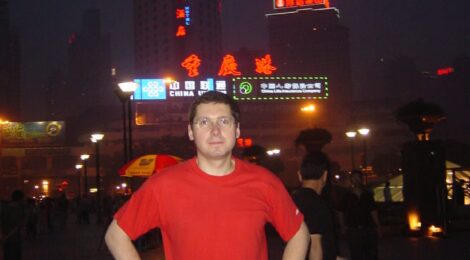
Galilei Circle of Friends – Interview with Bruno Lhopiteau

Today we bring you the story of Bruno Lhopiteau, Managing Director of Siveco China (www.sivecochina.com) and Bluebee Technologies (www.bluebeecloud.com), pioneers in digital solutions for maintenance and industrial risk management. As Galilei, we had the pleasure to support the organization of a open seminar with Mr. Lhopiteau, with Mr. Lorenzo Riccardi, head of the Global EBA programme in Shanghai, as presenter. Enjoy it!
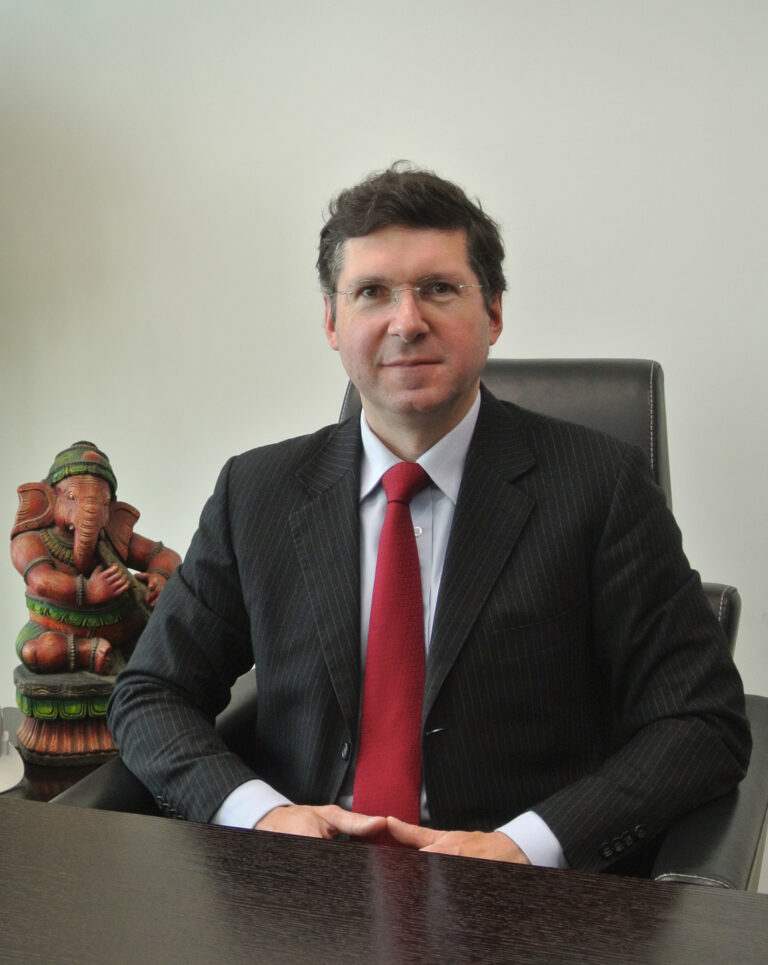
INTRODUCTION – Personal relationship with China
How did your experience with China begin? Was it a casual meeting, related to your work, for pleasure?
My mother says it all started because I had a cap with a panda on it when I was a kid. My parents lived in Cameroon before I was born and I think the oft repeated exotic stories influenced me tremendously. I have always wanted a life of adventures and the Far East was the most exotic of all places. I had probably read too many novels and comic books, not to mention role-playing games… To make a long story short, as an engineering student I decided to go to Sweden, already a somewhat exotic place for a Frenchman. There I met many Asian people including Chinese. After graduation I worked for a Swedish company that was in the process of setting up a factory in Dalian. I enlisted to go there as maintenance engineer. It did not happen (lots of delays in the project) and instead I joined the French Embassy in Singapore as a junior office working on various ASEAN initiatives and following infrastructure contracts. In the meantime I had met my future wife, a Shanghainese student in Sweden. Once in Singapore, I started looking for ways to come to China. After two years at the Embassy I joined a Swedish industrial IT firm that I perceived had strong development potential in China. Not many in the management team had the same idea (they thought China was undeveloped and risky), so it took me a while to convince the boss to finally send me to Shanghai at the very end of 1999. By then I had already visited China many times for holidays and for work.
How has your relationship with China evolved over time?
I easily adapt to new environments, so after Sweden and Singapore, not to mention many travels, I never had much difficulty in China. As a specialist in infrastructure maintenance, it always made sense to be in China and working here has taught me a lot. I started my own company in 2004, long before China become a trendy destination for entrepreneurs, in fact long before entrepreneurship becomes trendy! Family-wise, it was also obvious. I became a permanent resident in 2006, not long after permanent residency was introduced, so I was one of the guinea pigs for the “green card”. Meanwhile, my two daughters were born. So China is my home and has been for a long time.
What has your personal experience in this splendid country taught you?
Having been here most of my adult life makes it hard to distinguish lessons from China and lessons from just getting older and wiser. I have certainly become very patient over time, perhaps too patient sometimes. At the same time, I am quite sure it is the aggressively entrepreneurial spirit that I discovered in Shanghai in the early 2000s that inspired me to start my own business. Our work on maintenance, primarily with infrastructures but also with industrial plants, in the past two decades, has obviously taught me a lot. Experience that we have been able to export all over the world in the form of innovative maintenance software and by participating in overseas projects.
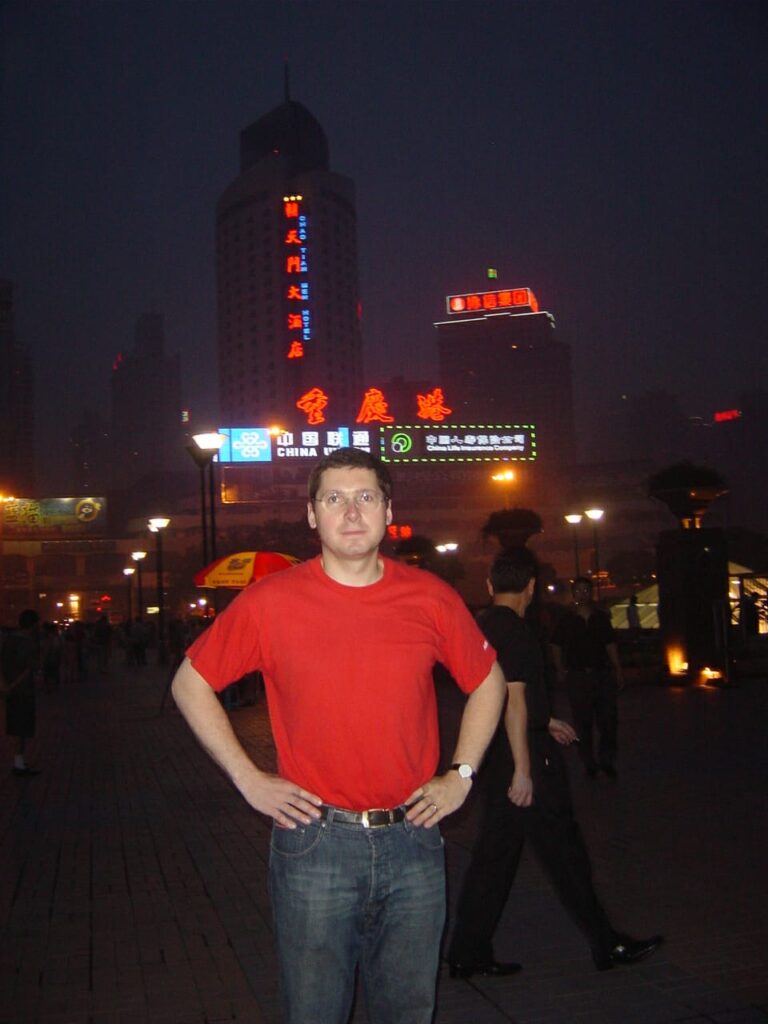
Chongqing in 2002 – Visits of Mr. Lhopiteau at Chaotianmen
2. BUSINESS in China and with China
How has China changed compared to its early years from a business perspective in your specific sector? What are the differences that most affected you positively and negatively?
We have been through phases. When I started it was very hard to convince clients to think of improving their maintenance. It was not a priority. Using IT was not very exciting either for them and I was often told that workers were not skilled enough. Early exceptions were with very large infrastructures, so I was lucky to work on Qinshan Nuclear Power Plants, the Three Gorges Hydropower Plant, as well as Shanghai and Beijing metros in the early 2000s. When I started my business focusing on environmental infrastructures, everyone thought I was insane. I foresaw the emergence of environmental regulations, the need for traceability in operation and maintenance, the increasing sophistication of technical installations and the necessary support to upskill and manage teams. At that time, not many people agreed.
In the following years, China successfully developed its infrastructures on an unprecedented scale and became the factory of the world. We were well-aligned with all great government campaigns: early informatization efforts in the industry (steel, pulp and paper, power), the Go West campaign when we were setting up our Chengdu office, the Belt & Road initiative (ever since we started the company we had been trying to involve in overseas projects, initially without success), safety and environmental regulations, etc. It is not that I was a visionary, it is simply that I was here. I was here and I knew something about infrastructure development, so it all made sense.
During these decades IT gradually became a popular topic, until recent years when industrial IT became totally overhyped, akin to magic in the mind of many. We then had to deal with unrealistic expectations and more particularly with a flurry of would-be competitors promising “predictive maintenance” dreams that of course failed to materialize. This has been our biggest struggle in the past few years, seeing clients wasting huge money in absurd technology developed by inexperienced vendors, witnessing so many ill-advised projects fail, so many vendors disappear and later clients telling us we were right but sorry they have no money left… The market has now calmed down and companies have learnt a lot, so I see very good potential in the coming years.
Tell us about your experience at Siveco China. What is your role and what are the main results you have achieved over the years?
I started Siveco China in 2004, initially a maintenance consulting firm using software developed by a partner company, a brilliant maintenance software supplier from France, still our partner today. In 2013 I started Bluebee Technologies, initially a R&D center developing new people-centric solutions for risk prevention, which I identified as the top priority: improving safety, ensuring environmental compliance, and integrating tools such as mobility, 3D models, and so on. I thought such solutions would complement our maintenance offering, more engineering focused, and allow us to better match local needs. The Chinese market was and still is paradoxical from a Western perspective: undeveloped in its maintenance practices, but learning fast; starting from scratch in terms of IT, but hungry for the very latest tech and able to absorb it fast, in part thanks to the lack of legacy software and existing habits. Very few foreign vendors understood this. I decided to invest heavily in this direction. Today Bluebee Technology is also developing outside of China, we have set up offices in Singapore, Bangkok, and we are looking at Africa. We also have partners in various countries. My role has been to start it all, to give directions, to keep hope in difficult times (we had many), to build a strong team. Our company directors have all been with me for more than ten years, and so have many key employees. We have built a very strong niche business and the potential remains enormous in China and in the world. We are already a global player in a market, that of maintenance or asset management software, with remarkably few global players. Exciting times are still ahead of us. Despite many struggles, it has also been a lot of fun, so I am satisfied and looking forward to our new adventures.
How important is it to know the local culture and language in your business?
It is fundamental to understand the culture in which you operate. I have to admit I don’t have grand theories on the subject, I am always amazed when I hear experts who have been in China for a few years, sometimes do not even live in China, yet can talk about Chinese cultural straits, differences with the West, with references to Taoism, the Cultural Revolution and what not. There are obviously real experts doing such work. As far as I am concerned, my brain does not operate that way, I focus more on living here, working, doing, not so much on analyzing and even less talking about it. Reading the classics is also a good way to get to know the local culture and a lot of fun too. Those books are not boring at all. I recommend 水浒传 (the Water Margin) and 三国演义 (Romance of the Three Kingdoms) in particular, great historical adventure stories with I think lots of insights into Chinese thinking. I also recommend to get familiar with Chinese history. Another area in which westerners have a huge blind spot is Dialectical Materialism, and more generally Marxism, although of course it is western in origin. This explains how most western observers cannot fathom Chinese government decisions. As for the Chinese language, it is very important as well. I am afraid I am not a good student and thus a poor role model in that regard. I can certainly get around quite well, but I am far from fluent. Now after so many years abroad, I have come to realize that different people have different natural abilities or willingness to adapt to their environment, as well as different priorities in life. All in all, all that matters is living well, which usually requires that you contribute positively to your local community. I think this is true anywhere in the world, although China puts more emphasis on it than the West. I love the slogan of a “global community of share future”.
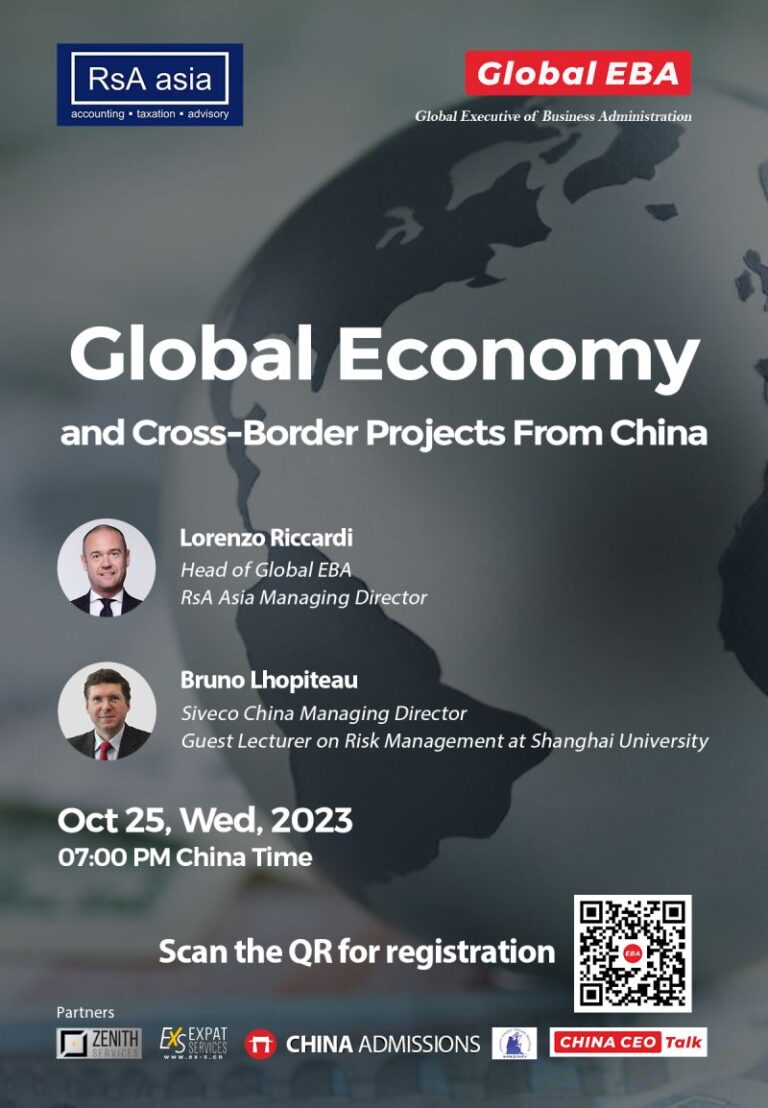
The webinar organized by Lorenzo Riccardi with Mr. Lhopiteau
Have you noticed any changes in recent years compared to your arrival from a work point of view? If so, what were the most significant?
I am described many changes already for my business. As I said, overall I am not inclined to such analysis. Some things change fast, some things remain the same. For example many aspects of the Four Great Classics are still relevant in modern China. Small things matter too: it used to be so difficult to find proper coffee when I first came in the late 90s, you had to go to one of the few five star hotels. Later Starbucks and again later other brands popped up everywhere. And don’t get me started on pizza! We also had a huge increase in the number of foreigners over the years, although it has dropped somewhat during Covid, which is absolutely fine with me. The fact that technology has become so prevalent is part of a worldwide phenomenon but China has carried it farther and faster.
How did the pandemic affect your business and what strategies have you implemented since its outbreak to respond to the crisis?
We responded immediately and very proactively. I was on holidays in Japan, came back and launched crisis actions. We were not at all alone in that and it was uplifting to see how many people, many companies, took on the collective effort. Apart from immediate risk management measures, and after all we are experts in this field, I decided to communicate positively from the start. Together with a group of French entrepreneurs in Shanghai, we also sent help to elderly care facilities in France, which we thought were neglected. As the situation evolved over three years, it culminated for us with the lockdowns in Shanghai where most our staff are based. Throughout the lockdown, we tried to be proactive and supportive, my kids volunteered in our community, I was playing an active role for the company and more generally I think everyone contributed as well as they could. As far as business was concerned, we did well, signing and implementing projects remotely. We even signed our largest contact ever during the lockdown for implementing the Operation & Maintenance Management System of a giant waste-to-energy plant in Hongkong.
What are the main challenges you have encountered in your experience as a successful manager in China? What are the positive surprises?
Hiring, training, retaining people is a major challenge. I think we have been doing rather well, as I said we have a strong and very stable team, yet it remains the main challenge. Arguably this may be true all over the world. Dealing with copycats, would-be competitors that in one way or another cheated us and their clients, almost always involving collusion with clients’ staff, has been a very unpleasant experience for me. As I often said, the majority of cases involved a foreign competitor or foreign staff. On the client side, I find multinationals to be very naive about this, while Chinese companies have more and stricter controls in place. In state-owned enterprises, punishment can be very stiff. As a result, the only two copycats that have not gone bankrupt yet only do business with multinationals. This pains me as it reflects badly on foreign companies. Positive surprises are not surprises anymore, but I have met so many good, clever and loyal people in this country.
How important is the role of technology in your business? From this point of view, is it an advantage for your company to be able to operate in China?
Technology, what we call Smart Operation & Maintenance is central to our business model. I think in the early days, foreign companies were more technologically advanced and actively took advantage of technology in business, which gave them an edge. Nowadays, the opposite may be true, Chinese companies are ahead of their foreign counterparts in this area. In reality, the picture is not so clearly black and white, but this is certainly the trend. The best companies combine the best of both worlds. We contribute to this in the area of industrial asset and risk management, combining western and Chinese expertise.
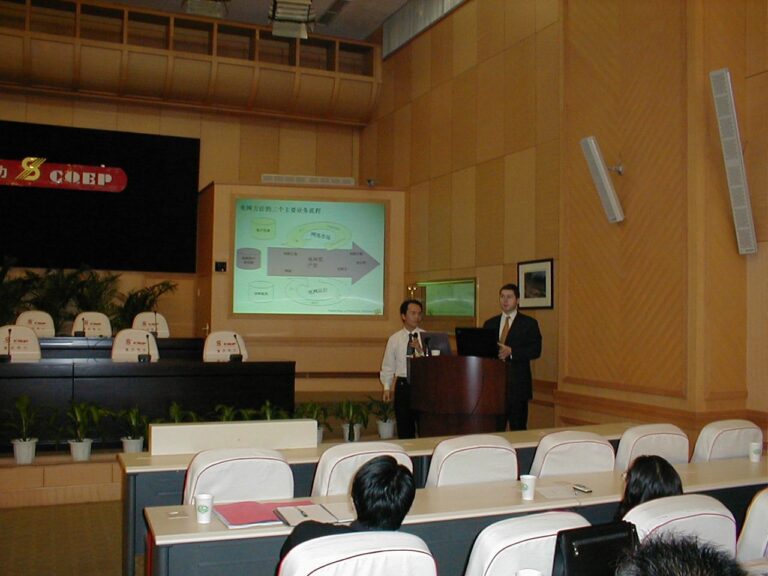
Chongqing in 2002: seminar for Chongqing Power Bureau
3. GOING EAST – Why does being in China make sense for a European company?
Why does it still make sense to focus on the Chinese market for a French/European company and what are the opportunities in particular in the part of the country where you operate?
Our own position is very special, as an entrepreneurial China-centric firm. I know European companies face political challenges. I was told by a large European firm, which recently withdrew from China, that their senior executives were concerned that due to their strong presence in the US market they were subject to US law… As their business here wasn’t that successful either, they preferred to call it quits. Media coverage in the west is not helping such companies. The Chinese market is also very competitive, so developing a business demands strength and patience. I have in the past advised multiple foreign technology SMEs in entering the Chinese market and I found many were not able or willing to invest so much. There are however many success stories for those who dare, including and perhaps especially for small companies or family businesses. Generally I think companies should conduct their own investigation of the market, come here and talk to people, instead of relying on third-party stories. Come and take a look by yourself.
Are you already present in Chongqing or in the Chengdu-Chongqing economic circle?
We have had business in Chongqing and Sichuan province for a long time. I keep great memories of a Chongqing Power Bureau seminar we conducted in 2002 and how we went to Chaotianmen for sightseeing in the evening, where folks were dancing and we took photos along the river. Today this site had totally changed, the iconic Raffles City Chaotianmen Building stands there, which also happens to be our client! The HVAC system of this huge 1 million square meters complex is managed using our bluebee system. We also work with the municipal water company and various energy plants. In Sichuan, we opened an office in Chengdu in 2012 as part of our Go West strategy, with a local team supporting clients primarily in the chemical industry. Today our business in this area is driven by one of our directors who is a Chongqing native, working with teams dedicated to specific large environmental and energy clients. Over the years, we have been very pleased with the competences and friendliness of local people, not to mention fantastic local food. Personally, coming from a mountainous region of France (and my grandpa originating from the Dolomites in Italy), I love this part of China and wish I could spend more time there.
How can the Galilei and the Sant’Anna in Chongqing be useful to your company in China?
We have always favored academic partnerships. We have been working with Shanghai University’s Sino European School of Technology for over 15 years. More recently, as part of Bluebee Technologies development in Southeast Asia, we have created links with Chulalongkorn University’s School of Integrated Innovation. For me, any initiative that contributes to better understanding between China and Europe, between people, is to be encouraged and I am happy to find more ways to cooperate. Industrial cooperation remains my focus, for example recent cooperation we have had with your institute on the Belt & Road Initiative, where we provided insights on how European firms can involve in Chinese-led infrastructure projects abroad. I think Italian energy companies in particular have great experience in such projects. Cultural links are also important. As part of our upcoming 20 years anniversary celebration, to illustrate our diverse origins on the Silk Road, we have decided to fund a cultural initiative related to the great travels between Europe and China. I would be happy to share the news with you once we announce it, but it is still a surprise as this stage!
Interview by Marco Bonaglia
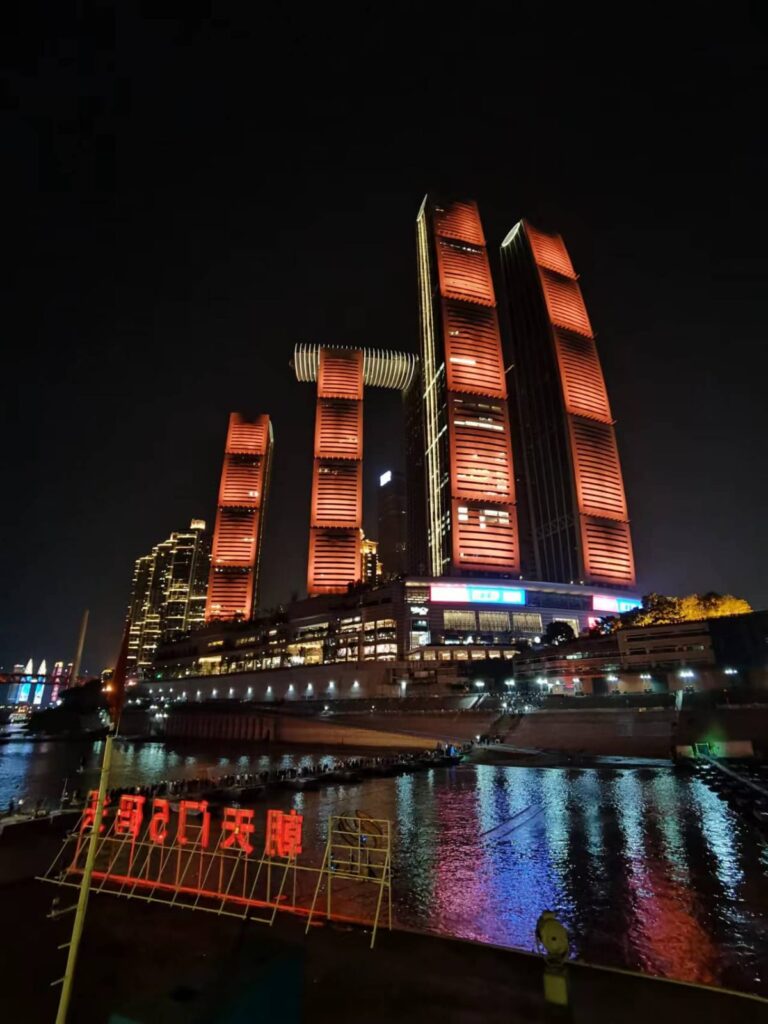
Chongqing Chaotianmen as it is today



